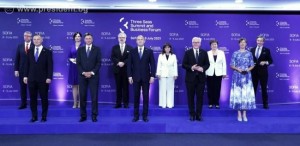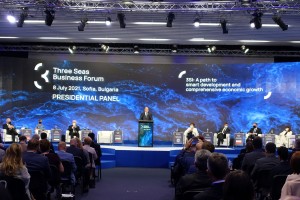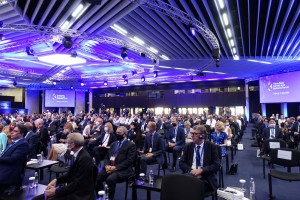Head of IMF: Economies in Three Seas Countries to grow by 1,2% faster than elsewhere in EU
The Managing Director of the International Monetary Fund, Kristalina Georgieva, gave a press conference on July 8. She was among the participants in the Presidential Panel of the business forum of the Three Seas Initiative: “Road to smart development and comprehensive economic growth”.
This is an initiative that coincides with the Bulgarian interest to have more attention to infrastructure problems and to rely on joint efforts to increase the competitiveness of the region, Kristalina Georgieva said at the beginning of the press conference.
She clarified that her role today was to respond to the invitation of the Bulgarian President and to present three topics.
"First: what are the economic prospects for the region, especially in the context of the most severe recession the world has experienced in peacetime since the Great Depression. Second: what are the priorities of the initiative, which from the point of view of my institution, the International Monetary Fund, fits well into the topic of accelerated development of this region. And third: what is the role of the International Monetary Fund," the head of the IMF summed up.
Georgieva said they expect the region, which covers the Three Seas initiative countries, to return economically to pre-recession levels by the end of this year.
"This level, from which we all collapsed as a result of the pandemic, will be reached again. We expect this region to continue to grow significantly faster than the old EU member states. In particular, for the five years of the initiative, growth in the countries of the Three Seas is almost twice as high as the average for the 15 old EU member states - 3.8%. When the EU economy shrank significantly, the decline in this region was 4% and the decline in older EU members states was almost twice as much," the head of the IMF .
The recovery in these countries is also faster, Kristalina Georgieva added. In the period up to 2025, the new member states participating in this initiative are projected to grow by 1.2% faster, which "will help continue the process of convergence, which the citizens of our countries rely on to improve the quality of life".
"We strongly support the focus on infrastructure and especially the high reliance on digital infrastructure. We have seen the pandemic accelerate digitalisation and it is crucial that we find a faster balance in what is being achieved and incorporate it into the strategy for low-carbon investment in transport and energy and in the strategy for greater resilience to climate change," she said.







